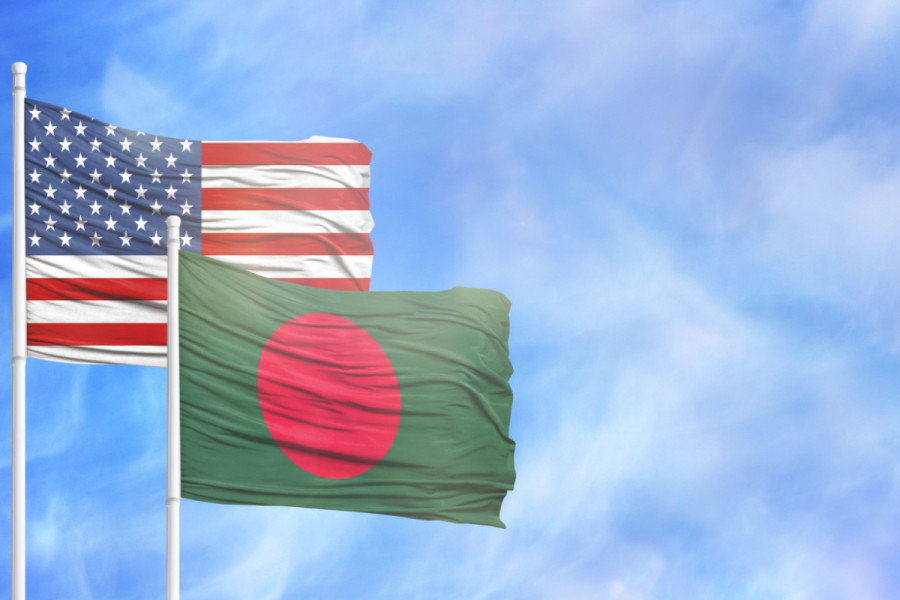Columns
US and democracy in South Asia
As recent history has shown, it is people who bring change, not any external power.
Smruti S Pattanaik
The recent announcement by the United States that it will be able "to restrict the issuance of visas for any Bangladeshi individual believed to be responsible for, or complicit in, undermining the democratic election process in Bangladesh" has led to a belief that it is interested in promoting democracy and is committed to protecting human rights. Though promotion of democracy has been part of US foreign policy for a very long time, it has used it selectively. History shows that the US has rather stood by military dictators and authoritarian regimes. Many of the regimes which are US allies are also accused of trampling democracy and human rights. Within the region, there are several examples of US condoning autocratic regimes, and this policy continues.
In the recent past, one has seen that US policy has significantly differed in Sri Lanka and Pakistan where people have risen up against the government for bad governance and economic distress. In Sri Lanka, the US took an active interest in Jana Aragalaya and was not against the change of government. This is not the case in Pakistan. It is important to recognise that the people's movement in Sri Lanka was completely led by Sri Lankans and left political parties that decided to bring the Gotabaya government to task.
It is interesting to note that in Pakistan, where the military plays a dominant role, there is no such visa ban. The US has used this visa policy to retain influence over the Pakistan military that remains a major ally in spite of China being the largest exporter of weapons to Pakistan and an all-weather friend.
It is the US which undermined the legitimacy of Afghan governments to negotiate a peace deal with the Taliban as part of its exit strategy, notwithstanding the fact that the Taliban has always expressed disdain for democracy and has no space for women in public life. Though the Taliban government is yet to be recognised by the international community, hardly anything has been done to improve the situation and the US is not bothered about the democratic downturn.
Why Bangladesh?
Bangladesh visa ban issue comes as a curious case. Earlier, the US had banned the Rapid Action Battalion for human rights violation, and it did not invite Bangladesh to Biden’s democracy conference when known autocrats and dictators were invited. Therefore, this visa ban does not appear to be aimed at protecting democracy. There are other geopolitical reasons behind this policy. Though many in Bangladesh assume that this visa ban will work more than US sanctions, it is likely to backfire as Sheikh Hasina has already accused the US of regime change. One has also seen how the pressure on Myanmar has not worked.
It is known that the US has been lobbying Hasina’s government to be part of the Indo-Pacific Strategy. The government has been extremely careful as China is a significant investor in Bangladesh. China has always been openly expressing its views against Bangladesh joining the US piloted Indo-Pacific Strategy. There has been a flurry of visits by high ranking US officials this year to woo Bangladesh to join it. China and India are keenly watching the US relationship with Bangladesh. After the US imposed the visa ban, one saw the visit of the Chinese foreign minister, perhaps reassuring Dhaka of its support.
Since the Awami League came to power, Hasina and the US have been at loggerheads over several issues. Some of the Western countries also gave a call to the Bangladesh Nationalist Party to disassociate itself from Jamaat Islami, the largest Islamic party in Bangladesh which was believed to be behind the street violence that saw more than 100 people burnt alive through the use of petrol bombs. This did not happen and it was Jamaat that took a tactical decision to move away from the Bangladesh Nationalist Party.
US-led Western countries took the lead to back the military-backed caretaker government that took over power on January 11, 2007 after a civil war-like situation arose in Bangladesh. The question is whether such intervention helps the cause of democracy in the long run.
Rise of people's power
The response to authoritarian governments needs to come from within as one saw in the context of Sri Lanka’s Aragalaya. That was a significant message that the people had sent to say that while elected governments do have the mandate of the majority, they cannot remain unaccountable after the election. Though the change in Sri Lanka has not brought much democratic dividends, it was an attestation of the people’s power to force change. The same can be said about Nepal where People’s Movement I and II demonstrated that the people’s will and desire for change ultimately triumphs. Bangladesh has also witnessed such changes in the past, especially the anti-Ershad movement and the 1971 movement.
While pressure is important and has often been used by those countries that wield leverage, it does not result in democratisation. The institutionalisation of democracy is an internal process. The erosion of institutions happens due to a corrupt elite that benefit from it. The weakness of the opposition due to various reasons is one of the major causes of the degradation of democracy. Therefore, the selective policy of the US of using democracy as an instrument of foreign policy to apply pressure lacks legitimacy. The visa ban will affect both the ruling party as well as the opposition as one really does not know what the US means by democracy. Is it free and fair election? Is it providing space to the opposition to engage in politics? And if it is political space, what is the contour of this space and who determines it?
Externalising domestic politics will not help the opposition in any country. Political battles need to be fought on the ground. Isn’t it Bangladeshis who rose against the Pakistan Army spontaneously? Can the draconian digital security act undermine the indomitable spirit of the Bengalis? As the Sri Lankans in 2021, Nepalis in 2007 and Pakistanis in 2008 showed, it is people who bring change, and not any external power. The final push has to come from the people.




 16.12°C Kathmandu
16.12°C Kathmandu















